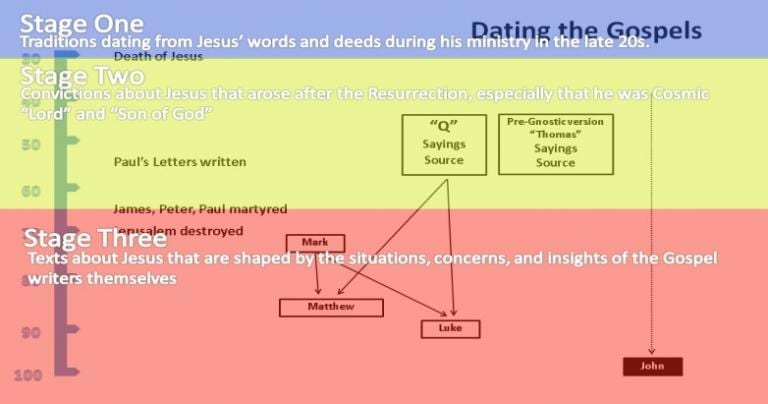
Jesus, Master of Insults, was not the sweet, polite, gentle figure we imagine in parishes and Sunday school.
For my next several posts, I will be responding to my fellow bloggers and their takes on this past Sunday’s Gospel reading of the Canaanite Woman and Jesus, Matthew 15:21-28. I also posted on the Gospel recently, here—Jesus Loses to a Foreign Woman.
I invite everyone to enjoy the excellent writing of my Patheos friends, Dr. Edwin Woodruff Tait of Light in the West and Jennifer Fitz of Sticking the Corners. Both are experienced authors, full of talent and wisdom, and I highly encourage my readers to check out their pages. Do that, and like me, you’ll be enriched.
But before getting into their thoughts, please consider this post a preamble. First, watch the brief video here, which tells a story for Western Christians about how Christ is perceived in different parts of the world.
Matthean Jesus, Master of Insults
I can’t remind my fellow Catholics enough that the inspired Gospels are not transcripts of factual events. Evangelists write from a third level or third stage in Gospel development. The Jesuses (yes, plural) they authored were different updated memories, interpretations, and events taken from Jesus the Galilean back in level one, sometime in the late 20s CE. Half a century following Vatican II has done nothing to prevent pooling ignorance among Catholics in this regard.

So we won’t really be exploring directly how the historical Jesus was. Instead, we will explore the Matthean Jesus. Is this Matthean Jesus consistent? The unknown, anonymous evangelist we name “Matthew” certainly presents Jesus consistently in one regard—as Jesus, master of insults.
Beginning of Matthew’s Narrative, Filled with Insults
“Matthew” remembers Jesus’ teacher John as another master of insults. John insulted the Pharisees and Sadducees by calling them “snake bastards” (Matthew 3:7). Like John, Jesus knew used this insult also (Matthew 23:33). Note also that in the agonistic, honor-shame cultural world of the Middle East, to insult someone’s parentage gets you murdered. That explains much about prophets such as John and Jesus.
The Matthean Jesus successfully answers the devil’s insulting challenges and thereby passes the honor test (Matthew 4:1-11). Jesus emerges from Alternate Reality as a genuine Holy Man (an Israelite shaman) who can navigate the spirit world without being possessed.
Sermon on the Mount Demands Salty People
Insults are very much on the Matthean Jesus’ mind in subsequent chapters, Matthew 5—7. “Matthew” edited together a collection of Jesus-sayings into a fictional sermon on a mythological mountain. The Matthean Jesus instructs his group to “rejoice and be glad” when others insult them (Matthew 5:11-12). The Matthean Jesus encourages them to be “salty people,” meaning “catalysts that burn people up.” In other words, respond to insults in kind. Salt in the peasant Middle Eastern world of Jesus is about fires, not seasoning or preserving food.
“Matthew” constructs this fictional Sermon beginning with Jesus insulting Judaean scribes (Matthew 5:21–48). The Matthean Jesus, thought to be a Galilean nothing-person, contrasts his interpretation of commandments with those of elite Torah experts.
In these antitheses, we see the Matthean Jesus hurling insults. And yet he also teaches: “Whoever insults his brother shall be liable to the council” (RSV Matthew 5:22). The word “insults” is used by the RSV to translate the term “Raqa.” Rēqā is Aramaic for ‘imbecile’ or ‘blockhead.’ Next, the Matthean Jesus says, “whoever says, ‘you fool!’ shall be liable to the Gehenna of fire.”
Ironically, later on in “Matthew,” Jesus himself uses this same insult against Pharisees. He calls them “blind FOOLS!” (Matthew 23:17).
Consistently Inconsistent
Scholars Bruce Malina and John Pilch remind us that the Matthean Jesus, in perfect Middle Eastern form, is quite comfortable with inconsistency. In this cultural world, people say one thing but mean something completely different. That is Jesus, to a tee.
Consider what happens when people ask Jesus questions. First, he usually responds by insulting them. Next, he tells a story that has nothing to do with what was asked him. Besides that, his parables say one thing but mean something else! Finally, Jesus’ questioners are left confused and insulted! Ultimately, and very unlike Catholic catechists, salty Jesus prefers this result.
This is normative inconsistency, folks. Therefore Jesus forbids an action (No insulting or calling anybody fool!). But then, later on, the forbidden action is acceptable, an excusable strategy in public exchanges. That’s typical of the Middle East. Here Jesus is being a typical Middle Eastern personality.
A Sermon from Jesus, Master of Insults
Continuing with the fictive Sermon on the mythological mountain, “Matthew” crafts the second part (Matthew 6:1–18) as a series of insults. These are explicit insults directed against the Pharisees. The Matthean Jesus uses his favorite insult, hypokrites—mask-wearing actors! He relishes this insult! Throughout “Matthew,” continually Jesus hurls it against the Pharisees (Matthew 6:2, 5, 16; 7:3–5; 15:7; 22:18; 23:13, 15, 23, 25, 27, 29; 24:51).
In “Matthew,” whether you’re literate or illiterate, you will be insulted by Jesus. But Jesus gives different insults accordingly. In his day, no more than ten percent of the total population was literate. In fact, literate people were probably around only one-half of one percent. Therefore illiterate people made up Jesus’ audience on most occasions, and we can assume the same on Matthew’s mythical mountain. To illiterate peasants, Jesus says, “You have HEARD… (Matthew 5:21, 27, [31], 33, 38, 43). And when he insults his illiterate, mostly peasant audience, he scathingly asks, “Have you not HEARD…?”
But in contrast, when dealing with literate retainers and elite, the Matthean Jesus instead asks, “Have you not READ…?” (Matthew 12:3, 5; 19:4; 21:16; 21:42; 22:31).
Mighty Deeds & Insults
After the Sermon concludes, “Matthew” details ten mighty deeds of Jesus (Matthew 8—9). Here we find the story of the humble centurion asking Jesus to heal his servant (Matthew 8:5-13). The Matthean Jesus replies by insulting his fellow barbarian Israelites (Matthew 8:10-12). Incidentally, the text nowhere implies that this centurion is a Gentile. Contrary to widespread misunderstanding, there were Israelite centurions.
Then the Matthean Jesus is asleep at the wheel during a storm. The disciples panic. They wake him up. And the Matthean Jesus promptly insults them, calling them “men of little faith” (Matthew 8:26). This is his favorite insult for his followers (Matthew 14:31; 16:8; 17:17, 20). In the Mediterranean Gospels, faith means loyalty. But the cowardly disciples have broken allegiance with God! So they seek help from the broker, Jesus. Consequently, Jesus, the shaman, intercedes, and God rescues them from the storm demon.
Jesus, master of the insult, doesn’t let up on his disciples! Look how he exhorts them to “become like children” (Matthew 18:3; see also 11:16–17). He doesn’t mean “become like American kids,” folks. In antiquity, with no way to control infectious disease and sky-high infant mortality rates, childhood was horrific. Therefore, “be like children” is highly insulting. Continually, the Matthean Jesus insults his disciples.
When Pharisees criticize the Matthean Jesus dining with tax collectors and sinners. he strikes back with insults. Jesus questions their competence as Scripture experts (Matthew 9:12-13; cf. 12:7). Outrageously, he instructs these educated men to discover the meaning of Hosea.
Matthean Jesus Has No Use for Gentiles
Contrary to American Christians who ethnocentrically demand he be a universalist, the Matthean Jesus has no use for Gentiles. Once he consolidates his political faction (Matthew 10:1–4), he sends his followers on a mission. Strikingly different from “Luke” and “John,” the Matthean Jesus kicks things off by insulting non-Israelites and Samaritans (Matthew 10:5-6). “Go nowhere among the Gentiles, and enter no town of the Samaritans.” The Matthean Jesus has ZERO interest in Gentiles and Samaritans, folks!
Do you know what the absolute worst insult in the Matthean Jesus’ repertoire? Calling his stubbornly resistant fellow Israelites “Gentiles” or “tax collectors” (Matthew 18:17). Gentile, or its synonym “dog,” is the worst insult Jesus can give. Keep that in mind. We will be returning to it soon.
Observe the Matthean Jesus advising his disciples on how to exit an inhospitable place (Matthew 10:14). To shake the dust from your feet is an insult, even if not verbalized.
Insulted and Insulting
Then “Matthew” presents a section of reactions to Jesus and his proclamation (Matthew 11:2—16:20). Name-calling and claiming someone “has a demon” (Matthew 11:18), is an insult meant to discredit. So the Matthean Jesus is called a glutton and a drunkard (Matthew 11:19), indicating he is a rebellious son. In other words, Jesus should be destroyed (Deuteronomy 21:20-21).
How does the Matthean Jesus respond? With an insult, of course, this time directed against Capernaum, his adopted hometown (Matthew 11:23).
Next up, Jesus unleashes another insult on the scribes and Pharisees. He calls them “an evil and adulterous generation (Matthew 12:39; cf. also 16:4). This probably alludes to their breaking the covenant with God in apostasy. The Gospels depict the Pharisees as believing themselves to be models of righteousness and pleasing to God. So imagine the weight of this insult!
To Some, Parables Are Insulting
According to the Matthean Jesus, his parables play a crucial part in his most rude and impolite strategy (Matthew 13:11). In other words, the Matthean Jesus intends to confuse, using obscure and secretive speech, leaving himself open to multiple interpretations. Keep ’em guessing, Jesus!
After the Matthean Jesus gets into another verbal brawl with Pharisees over purity issues (Matthew 15:1–20), Jesus insults his enemies sharply. He describes them as “blind guides” (Matthew 15:14; see also 23:17).
Having gone on our trip through this Gospel, you should now understand that the Matthean Jesus is a far cry from the sweet Jesus we present to youngsters in Sunday school. He is not a nice, warm Western gentleman, folks! Frankly, we would consider his orientation to be quite rude.
Insulting the Foreign Dog
Finally, we reach last Sunday’s Gospel (Matthew 15:21-28). Here Jesus levels the cruelest insult of his career. Who is the recipient? A gentile dog (Matthew 15:26). Having gone through the entirety of “Matthew” like we just did, should this surprise you?
First off, Jesus ignores “the foreign dog” (Matthew 15:23). This isn’t the United States, where strangers of different genders sit next to one another at the movies! This world is fiercely gender-divided, like 80 percent of the world today, Americans. In the Bible, unrelated men and women don’t engage socially in public. That may offend our enlightened American sensibilities, but the Gospels weren’t written for, by, or about Americans.
By ignoring her, the Matthean Jesus is doing something culturally appropriate. Nevertheless, it is still rude and insulting. And then he ethnocentrically explains his actions—“I was sent only to the lost sheep of the house of Israel” (Matthew 15:24).
Jesus Meets His Match!
The big surprise in this story is that the foreign woman beats Jesus at his own game of challenge-and-riposte. After he calls her a dog, she slaps Jesus back with a perfect parry and thrust. This results in the only New Testament episode, where Jesus loses an argument. But thankfully, Jesus is a good loser. So he grants her the favor and brokers healing for her daughter.
Next time, we will look at Jennifer Fitz’s 2014 piece on Jesus and the Canaanite Woman.
















